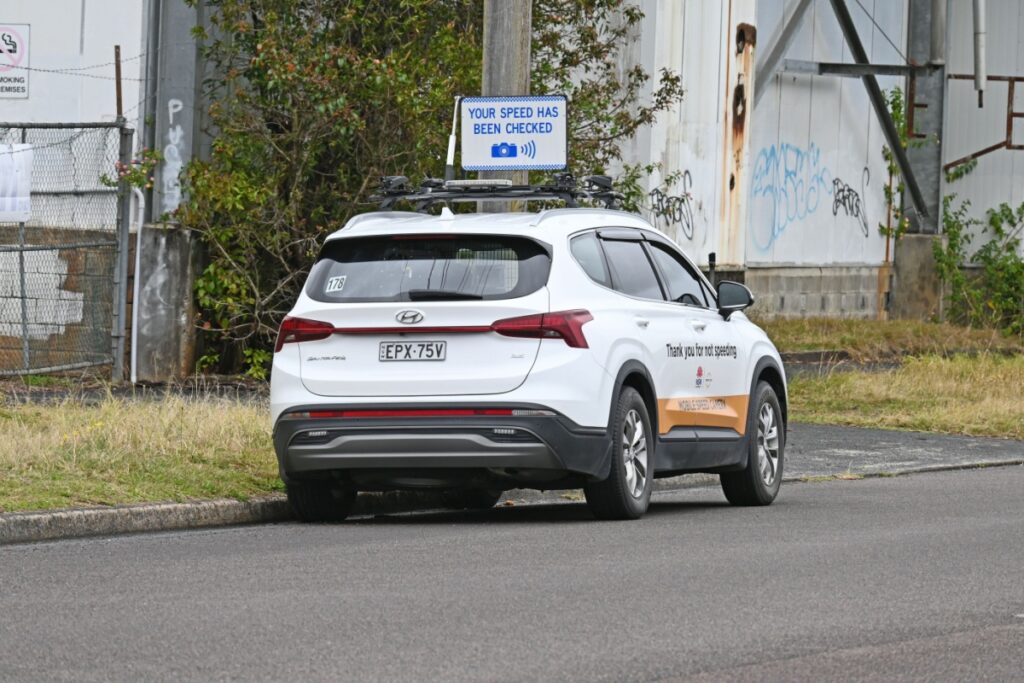In New South Wales, receiving a speeding ticket can be a significant inconvenience financially and for your driving record. If you believe you’ve been wrongly fined or special circumstances should be considered, you may want to consider appealing a speeding fine.
Understanding the process of contesting a speeding ticket involves recognising the legal avenues available to you and being aware of the relevant deadlines and requirements.
Understanding Speeding Fines in New South Wales
In New South Wales, speeding offences occur when a driver exceeds the speed limit and are detected either through mobile speed cameras or police patrols.
Usually, if you are caught speeding by a speed camera, you will receive your fine in the mail. If caught by police, you will usually be issued an on-the-spot fine like a parking ticket.
Speeding offences can result in fines, demerit points, licence disqualification, and, in severe cases, heavy penalties such as imprisonment.
These offences are in place because travelling faster than the designated speed limit exacerbates the risk of crashing, amplifies the severity of the injury, and increases the likelihood of severe consequences, such as death.
Contesting a Speeding Fine
If you receive a speeding ticket and do not wish to pay the fine, you have several avenues for appealing it. Section 24A of the Fines Act 1996 (NSW) allows individuals to request a review of their fine notice, which may involve minor traffic matters such as parking fines and speeding tickets.
It may be best to first seek a review of the penalty notice (discussed in ‘Alternative Options’ below) before going to court, as a preliminary review is not available once you start the court process and is a non-reversible decision.
It may also be best to contact an experienced traffic defence lawyer to assess the merits of your case before undertaking this option, as it can incur a criminal record and the court may order you to pay further costs if found guilty.
Eligibility for Appeal
If you decide to have your case heard and dispute your speeding ticket in court, you can apply through Revenue NSW to have the matter heard by a magistrate in the NSW Local Court.
To be eligible, you may wish to appeal your speeding ticket if you believe it was issued by mistake, the penalty was too harsh, or you have mitigating circumstances that may explain the alleged offence and have supporting evidence to support your dispute.
Preparing Your Appeal
To prepare your appeal, you must ensure you have gathered all evidence you intend to rely upon. This may include documentation that explains why the offence occurred, a copy of your driving record and engaging with a lawyer if you wish to be represented.
Filing the Appeal
To submit your appeal, you can lodge an application to go to court either:- Online via myPenalty
- Filing out a ‘Request to Have a Penalty Decided in Court – Individual’ form and upload it online or post
- Writing to Revenue NSW via letter. (In this circumstance, you should make a copy of your form or letter and supporting documents before you post them).
If you have multiple fines, you must complete a separate court application for each fine you wish to hear. There is no application fee to request to have a fine heard in court.
The Appeal Process
Once your application is approved, you will receive a court attendance notice stating the location of which court you will attend and the date and time.
When you first attend court, it will be for a ‘mention’ to determine if you wish to plead guilty or not guilty. You can do this in person on the day of the mention or by writing. This may be done by sending a ‘Written Notice of Pleading’ document to the courthouse before your ‘mention’ but by doing so you will not be able to explain the circumstances of the infringement in person.
If you plead guilty in person, you are admitting that you are accepting the facts against you. You will be given the opportunity to provide any further evidence that might assist the court and argue in some cases that no conviction is recorded. However, if convicted the Court can issue a fine, which would incur demerit points, potentially lead to you being suspended, and any other action the court orders.
If you plead not guilty and the Magistrate agrees that the evidence does not establish the offence beyond a reasonable doubt, the fine will be dismissed, with no demerit points incurred on your driver’s licence.
After the Appeal
If the magistrate finds you guilty and instructs you to pay the penalty or fine, and you experience financial hardship, you may seek to pay in instalments if you:
- Are able to repay the full amount in a three-month period, or
- Require more than three months to repay the full amount, or
- Are paying other fines off.
Alternative Options
As an alternative to court, you can lodge an application requesting a review on the Revenue NSW website up until the deadline stated on the infringement notice. Alternatively, you may also lodge this information via mail.
To be eligible, there must either be a mistake in the issuing of the fine or extenuating circumstances that led to the offence (such as a medical emergency or a vehicle malfunction) that may act as a defence.
Within your request for review, you must lodge the details on the speeding ticket, such as the penalty notice number and the date of the offence, along with proof of identification, such as your address, date of birth and driver’s licence number.
You must also lodge any supporting documents and relevant information, such as medical or vehicle repair documents, that will act as evidence to support your explanation of exceptional circumstances.
Once you submit your review, a response is usually given within 21 days; however, the process can take up to 42 days.
The available outcomes you may be given are:
- Penalty to stand – The fine was issued correctly, and you will be obligated to pay it.
- Caution – You have been found to be responsible for the offence; however, you are being afforded leniency. You are not required to pay the fine, but it may still appear on your driving record.
- No action – The fine was issued in error and will be cancelled.
- Cancelled – The issuing authority has requested the fine be withdrawn.
Regarding speeding fines, leniency may be considered in offences where the speed was under 20km/h, and the driver had a clean driving record for ten years before the offence occurred.
If you do not agree with Revenue NSW’s decision or your application is rejected, you can still apply to the courthouse, which will then have the authority to review.
Important Deadlines and Extensions
Application For a Magistrate to Decide:
If you apply before your fine is due, you can have your fine heard in court up until the due date on the fine reminder notice.
You must act quickly to lodge your application. If you don’t apply by the fine reminder deadline, you will need to prove through evidence that you were prevented from paying or managing your fine before the deadline—this is called a hindrance, and it acts as an extension if accepted.
If you’ve already paid your fine, you can go to court 90 days from the date the fine was issued.
If you have applied to have your fine reviewed by Revenue NSW, you can still apply for the courthouse to review it 28 days after you receive the outcome.
Application For Revenue NSW to Decide:
You can apply any time to have your fine reviewed as long as it is within the deadline stated on the infringement.
If your request is received after the due date, they may not accept it.
If you have already paid the fine in full, you have 60 days from the date the fine was issued to ask for a review.
Key Takeaways
- In NSW, speeding offences can result in fines, demerit points, licence disqualification, and even imprisonment. Speeding increases crash risk and severity of consequences.
- You can appeal a speeding fine if you believe it was issued by mistake, the penalty was too harsh, or there are mitigating circumstances. Section 24A of the Fines Act 1996 (NSW) allows requesting a review.
- To appeal, gather evidence, consider engaging a lawyer, and lodge an application to have the matter heard in NSW Local Court. You can apply online, by form, or by letter to Revenue NSW.
- In court, you'll attend a 'mention' to plead guilty or not guilty. If found guilty, the court may issue a fine, demerit points, suspension, or other actions. If found not guilty, the fine is dismissed.
- Alternatively, you can request an internal review from Revenue NSW before the infringement deadline, providing details and supporting evidence. Outcomes include the penalty standing, a caution, no action, or cancellation.
- Be mindful of deadlines for court applications and Revenue NSW reviews. Extensions may be granted if you can prove you were prevented from paying or managing your fine before the deadline.
Are You in Need of an Experienced Traffic Offence Lawyer?
If you have been fined or charged with a traffic offence in NSW and you can’t risk the demerit points or loss of licence, it is vital that you seek legal advice and legal representation.
The team at Hamilton Janke Lawyers have been recognised for their expertise in traffic matters by Doyle’s Guide and can provide you with sound advice and rigorous representation in court. Contact our expert traffic offence Lawyers now.
Written By

Drew Hamilton
Drew Hamilton is founding partner at Hamilton Janke Lawyers. Admitted to the Supreme Court of New South Wales as a Solicitor and also listed on the High Court of Australia register.




